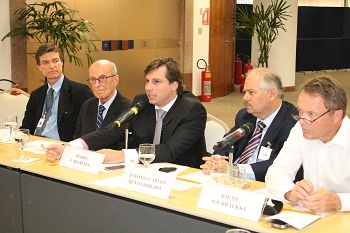On November 18, 2013, Firjan and NBCC organized an event on labor rights and the Brazilian wage adjustment process for NBCC members. The breakfast seminar took place in the Firjan building in downtown Rio de Janeiro, and about 25 people found their way to the seminar. Consul General Helle Klem and director of Innovation Norway in Rio de Janeiro, Helle Moen, were both present.
After enjoying a breakfast buffet, Dr. Luiz Chor, the CSR President at Firjan, gave the opening remarks. Thamilla Ferreira Gomes Talarico, the International Project Manager at the Firjan International Business Center, presented the Firjan system in more detail to the participants at the event.
Antônio Carlos Bento Ribeiro and Pedro Capanema then gave an overview on how the wage adjustment process in Brazil works. Antônio Carlos Bento Ribeiro is the Coordinator of assistance to employers association at Firjan, and Pedro Capanema the Labor Relations Chief Counsel at the Firjan Legal Department.
Photo: From the right: NBCC board member Kjetil Solbrække, Antônio Carlos Bento Ribeiro, Pedro Capanema, Luiz Chor and Alberto Besser, who is the superintendent at Instituto Euvaldo Lodi (IEL).
Powerful unions
Mr. Ribeiro explained how it is the primary basic activity of the company that will determine what union the employees belong to, and he described it as a “very rigid system”. For offshore companies, the situation might be even more complicated, as the company might have to relate to more than one union.
According to Mr. Ribeiro, the unions in Brazil are powerful, professional, well-trained and with a substantial financial support from the government. The companies and their federations need to be equally well prepared for conflicts.
“We have to stick together, exchange information and make plans. Information is key, and planning is vital to a successful negotiation with the unions.”
In case of a conflict, Mr. Ribeiro advises to try to solve the conflict without involving the labor courts.
“If you go to court, it can take 4-5 years to solve the conflict. It will increase your costs, and is bad for the company. It´s better to negotiate and keep trying. Even if there is a strike, you have to negotiate. It´s not easy. The company has to survive. The government does not create jobs, the companies do. Of course they have to adjust wages, but the overall objective is that the industry has to survive”, Mr Ribeiro said.
Flexibility
Pedro Capanema explained that although the federal laws and regulations must be followed, the companies are free to make their own regulations and internal policies. This is an easier approach, and such regulations do not have to apply to all employees, giving the company more flexibility.
“Working hours, minimum wages and safety regulations are issues were federal regulations have to be followed. But the Firjan system can help the companies in creating better internal regulations, and this is something that will have a direct impact on the cost of products and services. Consequences are big, and it is important that you give this some priority”, Mr. Capanema said.
Minimum wage was one of the topics the audience asked Mr. Capanema to clear up during the Q&A session after the presentations.
According to Mr. Capanema, the companies have to comply with the federal minimum wage even though the state minimum wage is higher. He also explained that the law permits you to offer a wage adjustment that is lower than the inflation, but this does however need to be very well justified. In Brazil it is sometimes easier to fire an employee than reducing his position from 100 to 50 percent.
Summing up, the Brazilian laws and regulations give less flexibility for local agreements in the workplace, and what the unions decide, companies have to comply with, to avoid penalties.
Firjan associates can however get information, share experiences and utilize the legal services offered. Firjan has useful contacts with several industrial unions and vital experience in a field that might seem intangible to many smaller companies.
During the event, Firjan also informed that an initiative is being taken to create a committee for Scandinavian companies in Rio de Janeiro. Although the effort is in an early stage, the idea is that the committee would provide different kinds of services for these companies and facilitate the exchange of information.
More on Firjan:
The Firjan system works to promote development of the industry in the state of Rio de Janeiro. The institutions that work together at the FIRJAN System include: FIRJAN – Federation of Industries of the State of Rio de Janeiro, CIRJ – The Industrial Center of Rio de Janeiro, SESI – Industry Social Services, SENAI – National Industrial Training Service and the Euvaldo Lodi Institute – IEL.
Firjan develops and coordinates studies, research and projects to guide the actions of industrial promotion and new investments in the state. It organizes thematic and sectoral forums, discusses trends and makes guidelines for actions of support and advice to businesses.
By Runa Hestmann Tierno, NBCC journalist
(runa.tierno@nbcc.com.br)
:


